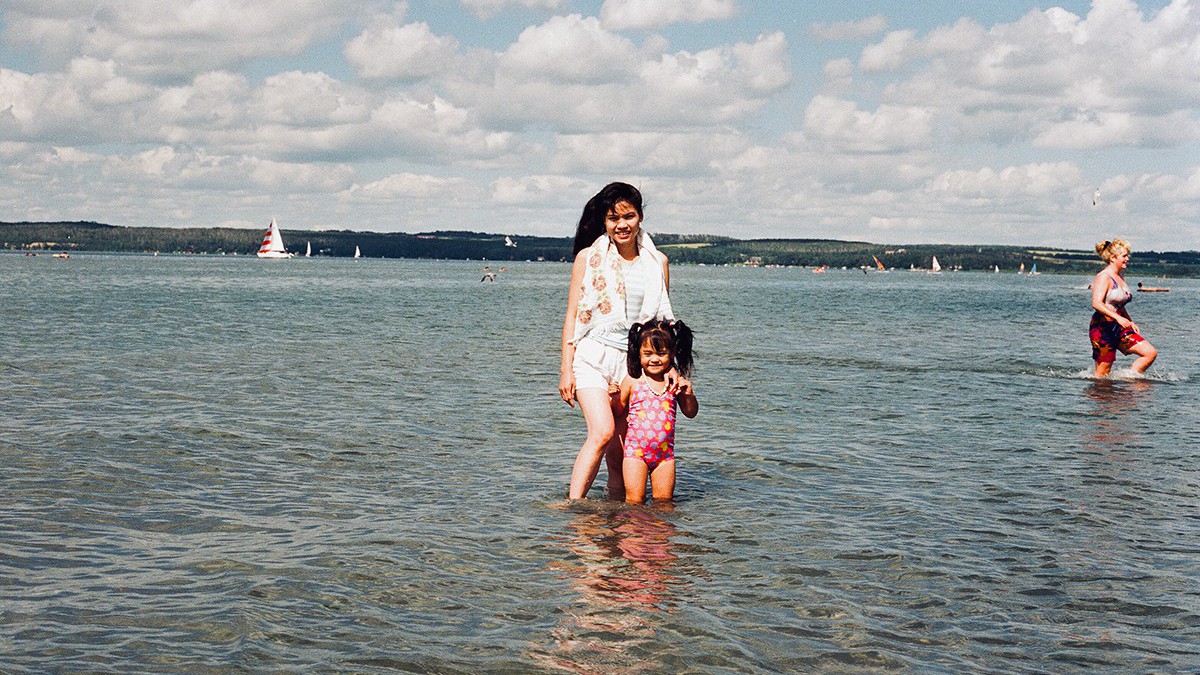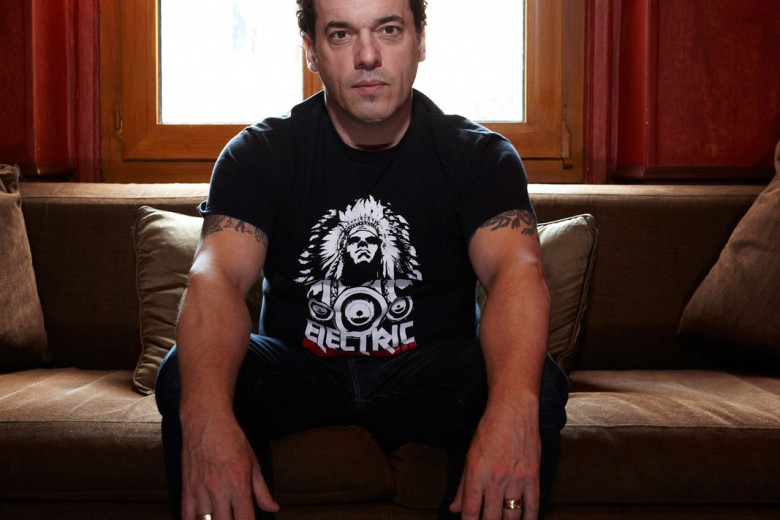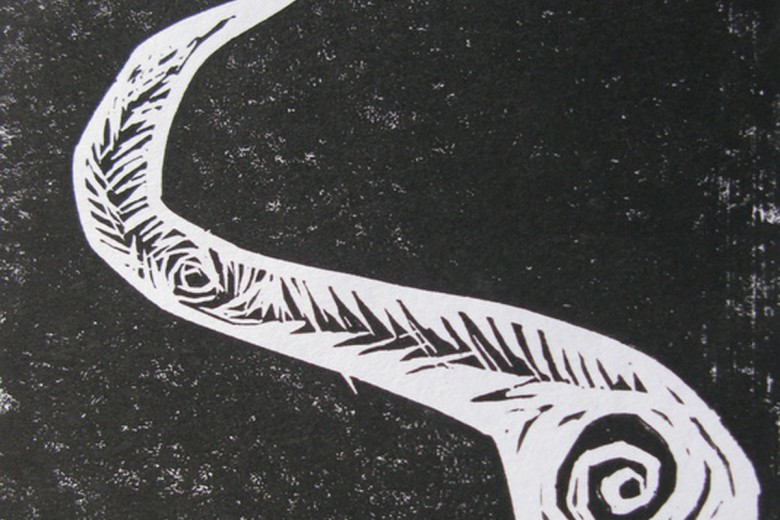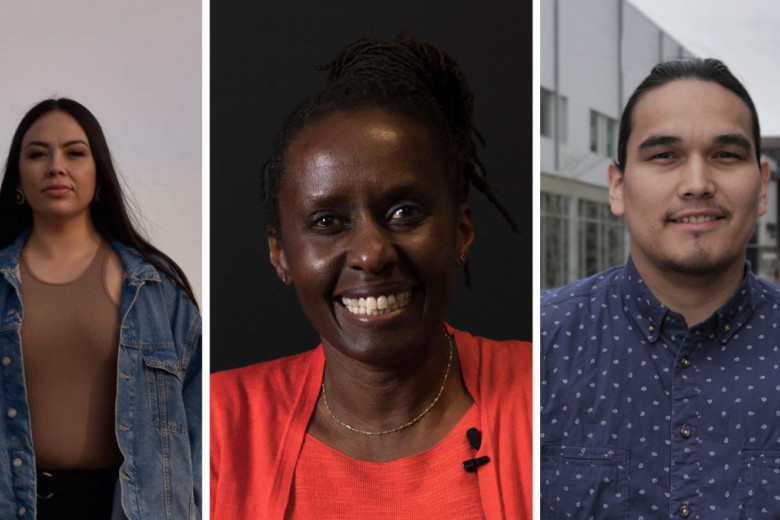Má, I’m lonely. Anxious. From the hospital lot, silver light pours in through the naked window. My on-call room turns aseptic white. A lunar desert. Here is not the land for the living. The smell – bleach, linen, and the faintest hints of sweat and spit – churns my stomach. I sit on the floor in pale green scrubs, my back rocking against the wall, my forehead pressing into my kneecaps. I shiver, hugging myself – less to keep warm, more to keep going. I want to cry. I wish the window could open. I would’ve jumped, Má. Sorry, but I would’ve.
Is this how it felt after you left the boat?
We are the boat’s people.
There’s no land we belong to.
When you and two younger sisters boarded the boat, it was so dark that opening or closing your eyes made no difference. Four nights, three days later, a Norwegian Red Cross ship destroyed your boat to rescue your group. Over the next five days, you drifted toward Singapore. But close to land, your ship was forced to wait as the government deliberated whether to accept more refugees. The sea deepened. If you were forced to turn back, you’d jump, you decided.
When the ship finally docked, you shook and stunk of piss and vomit. You were haunted by the waves, their whimpers and rumbles – an American submarine or a Communist ship ready to attack? But stepping onto Singaporean soil, you knew you were lucky – you hadn’t been robbed, beaten, raped, or sex trafficked by sea pirates.
“What was it like?” I asked.
“It’s the cleanest country in the world,” you said while folding a shirt.
“The boat, Má.”
You set the shirt down. “Don’t ever say that you want to jump.”
I didn’t understand what you meant back then.
We’re lined up for a shooting. Our grim faces float above short white coats as Dr. Woodman screams profanities, his neck bulging like an engorged penis.
“Why’re you late?” He turns to Felicia and me.
I don’t bother explaining that I had no luck finding a spare battery for my pager that died overnight, knowing he’ll call me a liar or lazy or worse.
But Felicia is still naive of how honesty is futile here, and she’s an Asian outcast like me – all the Asian med school cliques have rejected us – so I cringe for her when she says, “My pager didn’t go off…. A nurse told me about this meeting.”
He rolls up his sleeves. “Are you implying I forgot to page you? Are you? Say it again!” Spit sprays a solid metre in front of him.
She cries. I want to hug her but I’m a coward.
He puffs his chest, surveying the 10 of us. “I’ve heard things, and frankly, it’s pathetic. You’re self-entitled brats who expect to be spoon-fed everything. Don’t ask what the post-operative orders are for a sacrocolpopexy – figure it out. Fuckin’ unbelievable. You’re not here to be taught. You’re here to learn! For your first rotation, try to pretend you’re a little smart.”
He stares at Felicia. “What’s wrong with you?” Her empty hands wipe uselessly at her eyes. “Go. Back. Home!”
She runs. The door almost snags her ankle as it slams.
“Look at me! I’m going around” – he points at us – “and each of you better get it right.”
You didn’t fit in with your sisters. As the middle child of two sons and eight daughters, you bore a rebellious, anxious streak as a fashionable, androgynous ambivert who was creative but awkward, loving but unsure. You were my mom, and I was your mistake.
The news of my existence came after you fell during gym class. When you told your sisters the news, they bagged your clothes and kicked them like tumbling garbage cans down the street. For the second time in your life, you found yourself without a home or possessions. I’d reduced you from fashionista to travel agent, sister to whore, hot and free to pregnant. Reduced your husband from dentist to labourer 12-years-too-old, who was not only traditional and sexist but unstylish. Can you imagine?
There was one thing that made you feel like, well, not a million bucks, but at least a hundred bucks. We stole a little pride. We weren’t going for D&G or LV. This was stepping up from Walmart to The Gap. At Winners, you’d glide a hand down a sleeve, pinch off its tag, then repeat on another shirt – the cheaper one you didn’t want – and switch their tags. With your hands, you were a modern-day magician: switching tags, scrubbing floors, cleaving a rack of pork ribs, whipping us with coat hangers.
A sales clerk glared a warning at us. So, you bought both items, switched their tags at home, and returned the one we didn’t want. We began returning clothes every Sunday – after church. When the sales clerks started recognizing us, you taught me to forge your signature. “I’ll wait here,” you said as I hauled the bag out of the car.
After two weeks of assisting in surgeries where I must lean on one leg to clasp onto 9-12 forceps, I develop sciatica. Ibuprofen and stretching can’t touch it. I tear up just from walking. Sitting down is a two-minute procedure and sitting is hell.
“I need to see a doctor,” I tell the nurse practitioner.
“It’s that bad?” She chews her lower lip like a rabbit. “I’ll find someone to take your call shift.” She turns away. I’ll be asked to do something in exchange.
I limp quickly to the lot – there’s 30 minutes before the clinic closes. Driving there, I’m screaming as I’m crying. Someone’s running a hot blade down the back of my leg, Má. Every red light is fire consuming half my lower body. I want to floor it.
The next day, I tell the chief resident that my GP has advised me not to assist in surgeries till my pain improves. She doesn’t respond. I scrub in and stand to the side. At least I can observe, take notes, and write post-operative orders, I figure. The nurses are confused. I tell them about my leg, and they go quiet.
“Do you need to be told how useless you are in here or what?” She doesn’t even look up from the vagina spread out in front of her.
Later, she’s talking loudly to the surgeons and residents in the staff room. “Our generation learned everything on our own, milked every experience we could get. But these … kids … expect to get an MD without lifting a finger.”
She plops onto the couch, grey eyes smirking at me. “You gonna sit?”
I’m sorry I never told you, Má.
“It’s okay, I don’t need it,” I said to you.
“You like this Guess sweater more, right?”
I didn’t want us to switch tags anymore. I didn’t want to do it anymore.
You peered up at me from the bed. “I’ll get this for you. It’s the one thing I can do.”
“This is theft,” the manager said, a white woman with flawless makeup.
Our crusty Mazda idled outside, sputtering grey clouds against a greyer day. I thought how every morning you mixed bottles of makeup to paint the right colour on your face. In my mind, white people already fluttered up there, beyond the glass ceiling, their expansive, white wings blowing gusts of dignity and righteousness into our faces.
I wanted to say, “Ma’am, this one thing offers my depressed mom a small happiness. It’s not even the clothes – it’s the thrill. Please, she already gets chest pains, headaches, and rages that scare me…. When the house is quiet, I hear her screaming my name across the room – but no one’s there. My brain’s fear creates an echo of her. An echo, ma’am. My mom and me. We’re echoes. Undetected sonar. We’ll stay invisible for you.”
The couple, whose hands I held yesterday during the mom’s prolonged labour, wants to name their child after me.
“You’re a kind doctor,” the dad says.
“Intern,” I say. Like internment camp.
He waves off my correction. “Your doctor was mocking our decision not to have an epidural. So, can we? Name her after you?”
My name reminds me of a sad sum of fragments: Việt Nam, broken in two, then whittled down to Vi and Na. A name with no other attachment but to a country to which I don’t belong.
“Sorry,” I say.
My pager buzzes. At 3:05 a.m., the on-call doctor yanks as I push the baby through an eye-shaped wound in its mom’s uterus, fat, and skin. “Five minutes, 41 seconds,” gloats the doctor as she snaps off her gloves.
I slide across blood, amniotic fluid, and shit to vomit in the washroom. As chills unzip my spine, I gulp down cold meds, rub caked sweat off my face. The faucet runs as I pinch my nose above the porcelain. Poppies splatter across the sink.
By tomorrow afternoon, I’ll have been awake for 32 hours, given a presentation on prolonged labour, and downed two energy drinks and another pack of cold meds as my body nears shock. On the way home, I run two red lights and stop on a highway shoulder to breathe.
You married in a Catholic church to appease your family and restore your honour. Then, the party. Sharp-chinned Vietnamese refugee hippies rocked out on guitars, crooned into microphones, and swivelled in bell-bottoms, while other celebrants clapped and cha-cha’d, glowing with hope, love, and alcohol’s buzz.
You were all younger and naive then, before a white society wore you down. Before the generational gap and culture shock alienated you from your children. Before you learned the hardest truth: You could look and feel Viet but you weren’t – not when your home was here, not when your mother tongue stiffened against your teeth, and new Vietnamese words cropped up in songs, and long-distance calls were riddled with expressions you didn’t understand. Not when trips to Vietnam entrenched your beliefs that things should be cleaner, thoughts freer, people more polite, and your disbelief that an entire culture had evolved without you.
You were also an outcast here, where you thought “oven” was oh-vin and “vegetable” was veh-gedd-tah-bo. You knew how I shrank when you mispronounced things in front of an impatient clerk, how I felt embarrassed for asking my friends if I had an accent when I said “microwave,” how I was angry at you for giggling nervously when you ordered food or booked an appointment, and how I felt ashamed for feeling ashamed of all these things.
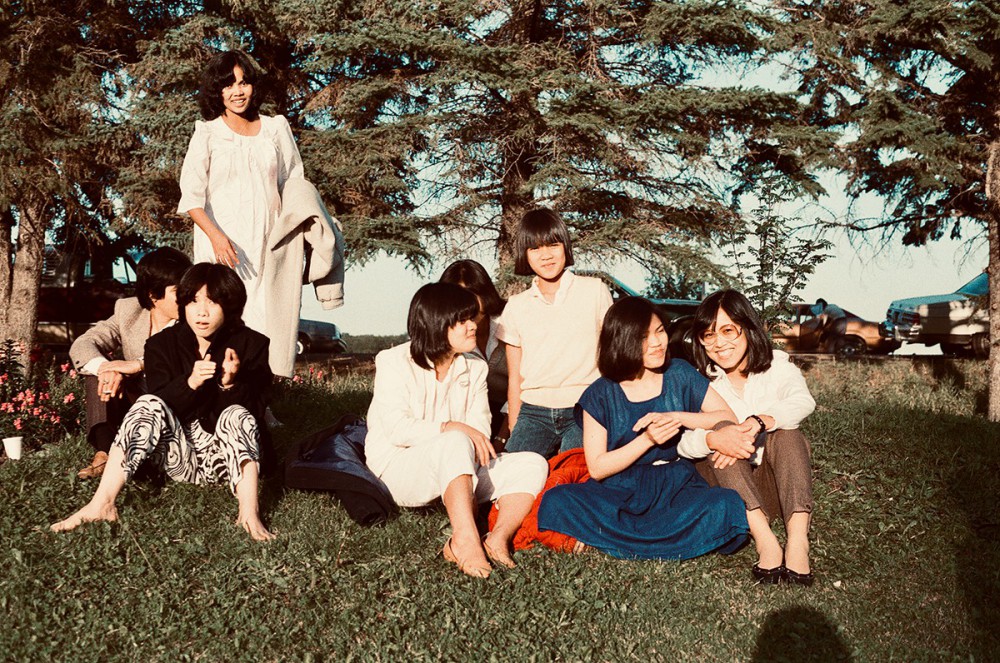
I’m tired of the sea. Where’s solid land, a home where I belong?
They find a lump in my breast – it’s benign. I start hoarding pills. My call shifts deprive me of sleep to the point where I don’t sleep anymore; Zopiclones fill a jar for a rainier day. Sciatic pain – vials of Oxy, Percs, and Cyclobenzaprines line a green bag.
In one moment, I swallow a rainbow.
I’m sorry I never told you, Má.
Về-ghét-ta-bô. Về (return), ghét (hate), ta (me)…
I was distracted when I read aloud from the class novel, Bunnicula, and accidentally said về-ghét-ta-bô. The kids laughed, and when they stopped, I screamed.
Return-hate-me.
What did they know about realizing that returning home would forever be intertwined with hating yourself?
Without the war, we would still be the boat’s people, Má.
We try to find land, where the joyful people are, but we only surround ourselves with water.
I’m sorry you came here to live, and I keep trying to die.
I want to live the life you wanted for me.
I want to make the best of your suffering. Make you forget how you feel reduced. Make you step off the boat and onto this land with a hand pressed to your chest as you say:
“I belong here. This is my home.”
Names of individuals have been changed to protect their privacy.
This essay was the winner of the creative non-fiction category of our tenth annual Writing in the Margins contest, judged by Larissa Lai. We gratefully acknowledge the financial support of the Regina Public Interest Research Group (RPIRG) for this year’s contest.


